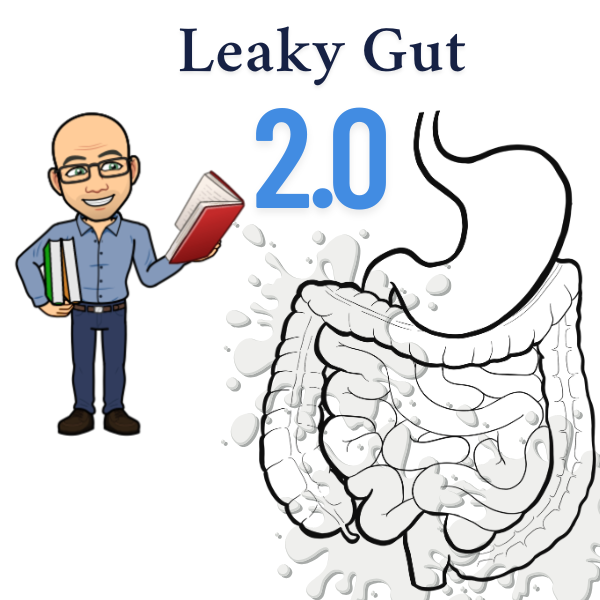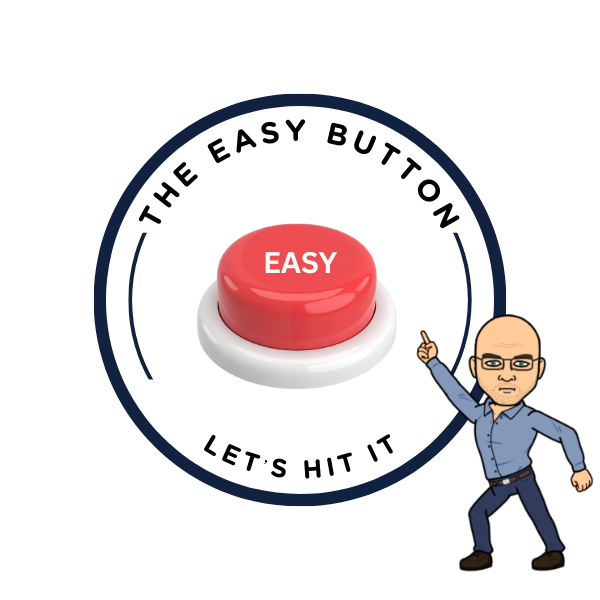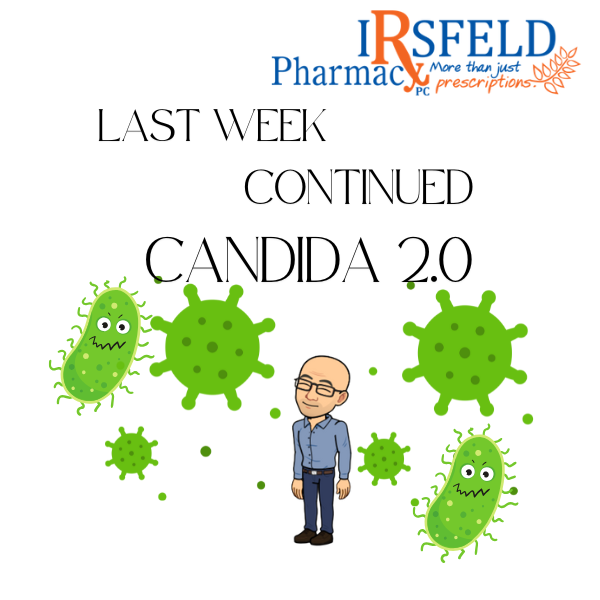New Years Resolution – The Core Four
Steve Irsfeld RPh • January 8, 2025
Let's Talk Foundational Nutrition...

The start of any year often begins with resolution and even though we are already a week into the New Year, it’s not too late to propose another option. When you think about a resolution, the focus is usually to make a change or do something to better improve our quality of life. Most often resolutions revolve around health and exercise but today I am going to talk about the Core Four
and why, if you don’t take a dietary supplement, it can provide great benefit in overall health.
A common question I hear at the pharmacy is, “I don’t take any vitamins, so where should I start?” That is an excellent question for two reasons; first, it is an indication that the patient is interested in bettering their health, and secondly, that they see value with supplements helping in that change.
The keyword in that last statement is value. The definition of value is; the importance, worth, or usefulness of something. Another word that fits into this conversation is quality. I have written articles on value and quality in the past, and they are essential attributes when choosing a supplement that you will be taking for many years to come. You get what you pay for in this arena.
The answer to their great question about where to start is quite simple, and we refer to it as the core 4. We call it “foundational nutrition” because it is the foundation of health, and without a strong foundation, the structure or body can easily crumble. The four supplements that comprise the Core 4 are Multivitamin/mineral, Vitamin D, Omega 3 Fatty Acids, and Probiotics.
Below is an explanation of the Core 4, along with a way to monitor levels in your body.
Multivitamin:
This is to fill in the gaps that our diets don’t meet. It is well documented that our food supply does not contain the same amount of nutrients as it did 40-50 years ago, and that is if we are eating a balanced diet. The goal is optimal health and providing nutrients is essential for making that happen. A micronutrient test can look at the levels of critical nutrients, and the cost is $400
Vitamin D:
This is formed when your skin is exposed to sunlight. Unfortunately, we live too far from the equator to allow the sun to make this happen year around. If it’s warm enough in April, the sun is potent enough, and getting 10-15 minutes of exposure should cover us until about mid-September. That means that we won’t be getting our daily dose of Vitamin D for 6-7 months out of the year. It only makes sense for us to supplement, and if you are like me, my tan usually comes from the fluorescent lights of the pharmacy. 5000IU/day is the adult dose that I recommend. You can test Vitamin D for as little as $50.
Omega 3 Fatty Acids or Fish Oil:
Unless you eat fish twice a week, you probably are not getting the necessary amount of omega 3 to help support cell structure. Omega 3’s are anti-inflammatory, essential for the brain, skin, and eyes, and have cardiovascular benefits. Omega 3’s are one of the few supplements that cost less to buy as a supplement than if you were going to get it from a food source. Dosing ranges from 1000 to 4000mg per day of EPA + DHA depending on the treatment plan. You can find these amounts under the supplemental Facts on the label. Testing your levels is an option and can be done for $75
Probiotics:
It seems a bit weird that we would add bacteria to our systems, and good would come from it, but yes, that is the case. Having a healthy gut flora, the combination of bacteria, fungus, and viruses line our intestinal tract, affects so many things: immune system, skin conditions, aging, digestive disorders, mood, and brain function, weight gain, fatigue, and more. It is almost impossible to help anyone who is not feeling optimal if they have an unhealthy gut that remains unaddressed. Many companies will look at stool bacteria for under $200.
As stated above, the Core 4 is foundational nutrition, and building a regimen off of that is where a personalized protocol comes into play.
That protocol could include joint health, gut health, inflammation, stress, or immune health, to name a few
Treating each patient as an individual needs to happen because we are unique. One of the challenges is meeting the patient where they are at in their health journey. Here are a few examples of that:
• How often can they take their supplement?
I can usually convince them that if they brush their teeth twice a day, they can take supplements twice a day, and I know this because I fall into this category.
• What can they afford to spend on a regimen?
Trying to work within the confines of this because if you bombard them with too much product they can’t afford, they can shut down and quit.
• And lastly, what are their expectations?
Regarding expectations, consider the following: “Your health is like a train speeding down the track at top speed. If you are in poor health, the train is going in the wrong direction. My job is to help you go from top speed, slowly decelerate until you come to a stop, change tracks, turn around, start moving, and get you back to top speed on the healthy track.” How long do you think it will take for this to happen?
Today, you often expect to make that happen by just taking a magic pill. I hope I don’t burst anyone’s bubble, but that train analogy will not happen by simply taking a pill. It requires hard work and commitment, something very different than a magic pill, and it may cost you more than that perceived magic pill, but, in the end, you will be better off for it.
Please stop by the pharmacy or call to schedule an appointment. Let us help you navigate the Core 4 or design a protocol to meet your needs. Please visit my website at www.irsfeldpharmacy.com
to view this and other health-related articles in the blog section.
Until next time, be vigilant about your health!!

Welcome back to all things Leaky Gut . Last week I went over what it is, some of the symptoms, and lastly the causes of leaky gut. The testing of leaky gut was also reviewed and as promised, I will dig deeper into the test and what the results mean. Lastly, we will discuss the treatment of leaky gut and possible retesting. Hippocrates in around 400BC stated, “all disease begins in the gut”. Gastroenterologist and the person who discovered zonulin, a leaky gut marker, Dr Alessio Fasano in 2020 took this concept a little further in a paper looking at zonulin and leaky gut and stated, “all disease begins in the leaky gut”. The leaky gut test I like to use is from a company called KBMO, it is called the Gut Barrier test and tests for occludin, zonulin, and lipopolysaccharides and a bonus marker for candida. If these are present in our blood, which is where they shouldn’t be, our body develops a defense against them, in the form of antibodies, to protect our bodies. Additionally, food sensitivity testing can be added to this test which is another important test to see which foods are potentially causing inflammation in your system. All the markers being tested are important in the gut barrier test, but one marker stand out, lipopolysaccharide or LPS because it is a signal for systemic inflammation. Some of the concerning characteristics of LPS include: • It is an endotoxin – a toxic substance found in the outer membrane of Gram- negative bacteria • Acts as extremely strong stimulator of the innate immune system • Triggers release of vast number of inflammatory cytokines • Crosses the blood brain barrier – LPS gets into the central nervous system potentially causing brain issues • Can create damage to the gut, joints, heart, liver, thyroid and lungs along with affecting metabolic and immune systems The huge takeaway from having LPS enter your system is that LPS is a trigger to inflammation and potential autoimmunity. If you have inflammation, getting a gut barrier test done may be the key to finding and addressing the root cause of the inflammation After performing the gut barrier test and finding out that you have a leaky gut, what are the treatment options? The 5-R protocol is the most comprehensive gut overhaul to consider if you are looking to get back on track. Here is the explanation of what this protocol looks like: 1. Remove all dietary triggers such as gluten, dairy, sugar, artificial sweeteners, soy, and alcohol. All processed foods and beverages should be eliminated along with unnecessary medications. Stop eating any foods you suspect you are allergic to or cannot tolerate or do a food sensitivity test to make sure you know which ones these are. This is also the place where killing agents can be used to tame opportunistic bacteria and fungus, so herbs like berberine, oregano, and garlic play a part in the removal process. 2. Replace the eliminated foods with fresh fruits and vegetables, high-quality protein, and healthy fats. Add fermented foods (sauerkraut, kimchi, kombucha) to your daily diet. If you struggle in this area, a good diet to look at would the Mediterranean diet which incorporates all the listed ingredients. Digestive enzymes to help with digesting food along with betaine hydrochloride when there is an issue with low stomach acid can be incorporated. Patients with stress issues are often unable to produce these when they are in state of “fight and flight” which is the opposite of the stress free “rest and digest” state. 3. Reinoculate your GI tract with beneficial bacteria to help restore and rebalance the microflora. A probiotic supplement containing L. acidophilus and B. lactis strains, in addition to akkermansia, these are all types of bacteria that should be added to your daily diet in addition to at least one serving of a fermented food. 4. Repair your GI tract with targeted supplements and lifestyle modifications intended to promote healthy inflammatory markers and accelerate healing. Repairing the gut can incorporate products containing zinc carnosine, glutamine, colostrum, and ingredients that are mucus like so okra, slippery elm, marshmallow, aloe vera, and licorice root. 5. Retain the gains . Gut health is an ongoing process. Adopt the eating, exercise, and stress management strategies you have been incorporating as part of your new lifestyle. Continue to eliminate dietary triggers, follow a clean eating plan, and take any nutritional supplements recommended by your healthcare practitioner. The 5R protocol also incorporates macronutrients such as omega 3 fatty acids and prebiotic/fermentable fibers are helpful in closing the tight junctions. Micronutrients such as Vitamin A and D have data to support the healing of tight junctions so optimizing those levels can be helpful. The 5R program can be a little daunting as it incorporates lifestyle modifications along with a few dietary supplements however, for patients who have been struggling with gut issues for long periods of time, the protocol can be a huge benefit to those individuals. Leaky gut is a big deal and one that is not spoken about in traditional medicine. The ability to test for markers which would indicate a patient has a leaky gut is a huge advancement in gut health. If a patient’s test comes back indicating they have a leaky gut, we have protocols that can help heal and then retest to make sure we are successful in this process. So many of the topics I discuss in this weekly article feed back to the concept that inflammation is the cause of many of our health issues and leaky gut can be a key component in this battle against inflammation. Stop by the pharmacy or call 701-483-4858 to schedule a consultation to explore testing and treatment of leaky gut. Please visit my website at www.irsfeldpharmacy.com to view this and other health related articles in the blog section. Until next time, be vigilant about your health!!

This week’s article will cover Leaky Gut , a topic discussed previously but now has some new developments especially in the form of testing. Why does so much of my focus revolve around the gut? Hippocrates stated in the 460AD, “All disease begins in the gut”. If this is true, which I believe it is, it is critical that we work hard as we can to make our intestinal tract happy and healthy. Before diving into leaky gut, we need to look at our immune system and how our gut is an important part of our immune system. One part of our immune system has to do with structure, so think skin, lungs, and gut or gastro-intestinal tract. If these areas are compromised, we can let things get into our system that don’t belong there and can eventually cause issues. Leaky gut is also referred to as hyper-permeable gut and the concept is surprisingly quite simple. Our intestinal tract is a tube that runs through our bodies from our mouth all the way to our backside. This tract, or tube is a closed system where when it is healthy, only the things that our bodies are designed to let in get in. It is a barrier to protect our bodies from things like bacteria, virus’, toxins and undigested food. When intact, it is one cell thick and these cells are packed tightly together allowing only small particles or nutrients to be absorbed through and between the cells. When the lining of our gut becomes damaged, it becomes more permeable or porous, developing gaps between these cells and our gut becomes leaky. Think of a bowl that has now become a sieve. These gaps allow foreign substances to be absorbed and our bodies begin to develop antibodies to these substances. This is the start of an inflammatory process. It is in this process where the problem becomes amplified with repeated exposure to certain foods, which can make the immune response go crazy. One such food is gluten a protein complex found in wheat, barley, spelt and rye. Many people believe that gluten sensitivity and gluten free diets are is just a fad or a health craze that will soon go away. Gluten sensitivity is a IgG response to gluten. It is not an anaphylactic reaction but a low-level inflammatory response this is often times not immediate. When embarking on a gluten free diet, it takes some time for your system to purge itself of gluten and then to have the inflammation subside after the gluten has been removed. The process takes 3 weeks and even a small amount of gluten exposure resets the clock. If there is not complete removal of gluten or any food, it will be hard to correlate a food sensitivity as the cause of their illness. Gluten, unfortunately, is in almost every meal that is in the Standard American Diet and if you don’t remove it over a period of time, you will never rid yourself of the inflammation. I recommend that patients go on a modified elimination diet if they have a chronic disease. This diet is designed to remove the most allergenic foods: gluten, dairy, eggs, corn and sugar . Many of those patients who adhere to the diet for 2-3 weeks find themselves feeling better that when they were not on the diet. What are the signs or symptoms of leaky gut? • Digestive issues such as gas, bloating, diarrhea or irritable bowel syndrome. • Diagnosis of candida overgrowth. • Seasonal allergies or asthma. • Diagnosis of chronic fatigue or fibromyalgia. • Hormonal imbalances such as PMS or PCOS. • Diagnosis of an autoimmune disease such as rheumatoid arthritis, Hashimoto’s thyroiditis, lupus, psoriasis, or celiac disease. • Mood and mind issues such as depression, anxiety, ADD or ADHD. • Skin issues such as acne, rosacea, or eczema. • Food allergies or food intolerances. One of the reasons leaky gut is hard to pin down is that it can be hard to correlate skin issues, fatigue and seasonal allergies or any of the other symptoms as coming from the same source. Cause of leaky gut can be lumped into 4 main areas: foods, infections, toxins, and stress . For most cases it is not one individual thing but the sum of many factors. • Toxic foods provide little nutritional value, can deplete nutrients and slow the gut down causing it to produce more toxins. Processed foods invariably are low in nutrients and fiber, with high levels of food additives, chemically modified fats, and sugar. These foods promote inflammation of the GI tract. • The most common infectious causes are candida or yeast overgrowth, intestinal parasites, and small intestine bacterial overgrowth. Taking antibiotics can affect the balance and nature of bacteria on our gut. • Toxins come in the form of medications like ibuprofen and naproxen, steroids, antibiotics, and acid-reducing drugs, and environmental toxins like mercury, pesticides and BPA from plastics. Toxins stress our immune system and the body's ability to repair itself. • It seems like stress is a recurring theme in many chronic conditions . It is tough to see the correlation between stress and our GI system but it is ongoing but in the presence of stress our body’s immune response is diminished. How can we tell if we have a leaky gut? The best way is to find out if you have antibodies in your blood of things that shouldn’t be in your blood. The test I like to use is from a company called KBMO, it is called the Gut Barrier test and tests for occludin, zonulin, and lipopolysaccharides and a bonus marker for candida. If these are present in our blood, which is where they shouldn’t be, our body develops a defense against them, in the form of antibodies, to protect our bodies. You will be pleasantly surprised by the cost of the test in relation to the information it provides. In next week’s article, I will further discuss the results of the KBMO test and what it means along with treatment options to help heal a leaky gut and ultimately, take control of your health. Stop by the pharmacy or call 701-483-4858 to schedule a consultation to explore testing and treatment of leaky gut. Please visit my website at www.irsfeldpharmacy.com to view this and other health related articles in the blog section. Until next time, be vigilant about your health!!

Have you ever been told that something easy and it turned out to be hard? The topic of this article has some easy ways to decrease the risk of getting cancer. So where does the “easy” button come in? When I go to my accountant’s office, they have this huge button with the word EASY on it. When you push the button a computerized voice says, “that was easy”, based on the current tax laws, I question how often that button gets pushed. I think we can all agree that reducing the risk of cancer is a topic that should pique our interest as cancer has affected so many people personally and in their families. Today’s article will look at some simple, EASY, and inexpensive ways to lower your cancer risk. Most of the reading I do revolves around health and wellness, but every once in a while, I sneak in a Jack Reacher or Gray Man book to mix it up. The reason I read health related topics is twofold, first, I’m always looking for a topic to write for this weekly article and secondly, I really enjoy the subject and am always wanting to learn more information on how to be healthier. In a recent social media dive, I came across a study titled “Combined Vitamin D, Omega-3 Fatty Acids, and a Simple Home Exercise Program May Reduce Cancer Risk Among Active Adults Aged 70 and Older”. The study was published in 2022 in the publication Frontiers in Aging and must not have gotten much uptake especially in the media which was quite shocking. As people get older, their risk of developing cancer naturally increases. Scientists have been looking for safe, simple ways to lower this risk, especially for older adults. A recent study titled “Combined Vitamin D, Omega-3 Fatty Acids, and a Simple Home Exercise Program May Reduce Cancer Risk Among Active Adults Aged 70 and Older” explored whether combining three easy-to-follow health habits could help prevent cancer in people aged 70 and above. The study wanted to find out if taking vitamin D supplements, omega-3 fatty acids, and doing a simple home exercise program could work together to lower the chances of getting cancer. Researchers already knew that each of these things — vitamin D, omega-3s, and exercise — might have some benefits on their own. But no one had tested what would happen if older adults did all three at the same time. The study included over 2,100 healthy adults aged 70 and older from five different European countries: Switzerland, Germany, Austria, France, and Portugal. These participants were all still active and living independently when the study began. The average age was around 74 years old. The researchers randomly divided the participants into eight different groups. This was so they could test different combinations of the three treatments (vitamin D, omega-3, and exercise) to see how they worked separately and together. • Some participants took a vitamin D supplement (2000 IU per day) • Some took omega-3 fatty acid capsules (1 gram per day) • Some followed a simple home strength exercise program (3 times per week) • Others took placebos (fake pills with no real effect) or didn’t do the exercise program The exercise program was designed to be easy and safe for older people to do at home. It included basic movements like standing up from a chair, balancing exercises, and light strength training using body weight. The study lasted for three years, during which the researchers tracked who developed cancer and who didn’t. The results were very interesting. On their own, taking vitamin D, omega-3 fatty acids, or doing the exercise program slightly reduced cancer risk, but the changes weren’t very big. However, when participants combined all three interventions together — taking vitamin D, omega-3 supplements, and doing the simple exercise program — the results were much more impressive. The group that did all three saw a 60% reduction in the risk of developing cancer compared to the group that did none of them. This means that doing these three simple things together may have a powerful effect in lowering cancer risk in healthy, older adults. Each of these three habits helps the body in different ways: • Vitamin D helps keep bones strong and may support the immune system, which is the body’s natural defense against diseases like cancer. • Omega-3 fatty acids are healthy fats often found in fish. They can reduce inflammation and may help cells stay healthy. • Exercise improves overall health by strengthening muscles, improving balance, increasing energy, and possibly boosting the immune system. • When combined, these three healthy habits may work together to make the body stronger and better at preventing cancer cells from growing. This study is important because it shows that simple, everyday actions can have a big impact on health — especially for older adults. None of these treatments were expensive or difficult to do. Vitamin D and omega-3 supplements are easy to take, and the exercise program could be done at home without needing to go to a gym. Also, this study involved a large number of people across several countries, making the results more reliable. While these results are very promising, the researchers say that more studies are needed to confirm the findings and see if the benefits continue over a longer time. But for now, it gives hope that older adults can take easy steps to lower their cancer risk and stay healthy. If you are reading this article and are under the age of 70, it is not guaranteed that the benefits will extend to individuals of younger ages. However, incorporating these items into your daily routine should be straightforward. If you are questioning whether you need to take these nutrients, we can always test for vitamin D and Omega 3’s with simple at home tests to find out if you are deficient. Circling back to the EASY button , it’s time to press it today and get started on a program that can decrease your cancer risk easily. My staff and I would like to help you with questions regarding lowering your cancer risk, so call or stop to schedule a consultation. Please visit my website at www.irsfeldpharmacy.com to see this and other archived articles in the blog section. Until next time, be vigilant about your health!!

Last week's article covered the basics of uric acid, what happens when it is elevated, the causes of the elevation, and how to decrease uric acid in your system. Today's article will cover another the dark side of uric acid from the book Drop Acid by Dr. David Perlmutter, looking at the evolution of uric acid and some surprising influences that affect its level. May the force be with you, as you venture into more information!! Uric acid has been downplayed as a little know metabolic waste product that has little to do with our overall health unless it becomes so high that gout and renal stones occur, as discussed last week. Based on that statement, that is many providers today have been educated on the effects of uric acid in our bodies, including my pharmacy education. We are going to take a step backward and look at the inner workings of our bodies and the formation of uric acid, and what happens when it starts to increase. Purines are directly converted into uric acid , our body naturally produces about 2/3 of them, and the other 1/3 is obtained externally in our diet. Purines alone are not bad, but when they become elevated, they become a concern. A study looking at heart disease found that elevated uric acid correlated with increased blood pressure. The high uric acid causes oxidative stress, constricts blood vessels, and constant elevation of uric acid causes lasting injury and inflammation in the kidneys, making them unable to ride our bodies of excessive salt, causing increased blood pressure. They found that 90% of patients with newly diagnosed high blood pressure had high uric acid and when treated with allopurinol, 85% of the patient's blood pressure normalized. The study and ongoing research prove that high uric acid is a problem for all of us. Our bodies have evolved, and most mammals have an enzyme called uricase which breaks down uric acid so that elevations don't occur. Humans do not have that enzyme, and here is the reason why. Thousands of years ago, when food was not always available like today's, man would eat as much as possible when food was plentiful. During times when fruit and meat were abundant, they would gorge themselves. Meat contains purines, and the fructose in fruit is converted to purines as well, elevating our uric acid. Without uricase to break down uric acid, our bodies would start to store the excess calories from fructose into fat. This excess fat would allow us to survive during lean times. A yearly cycle of increased fat, then fat is used for survival, and the cycle continues. Herein lies the concern, we do not have times when food is unavailable for us to eat. There are no lean times where we need to draw on our fat stores because food is always plentiful, so our bodies continue to pack on fat that never gets tapped into unless we consciously try to eliminate the fat. A major hit to our dietary habits was the increased consumption of high fructose corn syrup from 1970 to 1990, which increased by 1000% during this period. This surge coincided with increased obesity and other health conditions aggravated by elevated uric acid levels. Consuming fructose is associated with impaired glucose tolerance, insulin resistance, high blood fats, and high blood pressure. Fructose does not trigger the production of insulin and leptin, and these two hormones are responsible for regulating our metabolism; therefore, diets containing high amounts of fructose lead to obesity and the metabolic backlash that follows. Fructose also increases uric acid, which leads to other health issues. Studies show that men with a uric acid above 7mg/dl and women above 5mg/dl significantly increased all-cause mortality and cardiovascular mortality, meaning those with increased uric acid are more likely to die from diseases than those with a lower uric acid level. However, the optimal level seems to be less than 5.5mg/dl. Elevated uric acid = inflammation, and as you know, inflammation is a driver for most diseases and illnesses, from cardiovascular disease to Alzheimer's disease. What do we do with this information? The first thing would be to measure our uric acid and find out if you are a person that has elevated uric acid without the typical gout symptom. Testing can be done in your doctor's office with a blood test. They now have at-home uric acid monitors like those used to test blood glucose. Simple steps that apply to anyone, not just those with high uric acid, include exercising, getting adequate sleep, staying hydrated by drinking ½ your body weight in ounces of water per day, reducing stress, and decreasing sugar and processed food consumption. Last week I talked about using allopurinol and febuxostat, prescription medications, to lower uric acid. There are natural products that can also help reduce levels. Quercetin is a polyphenol with an antioxidant and anti-inflammatory benefit that is helpful in the fight against inflammation. Quercetin can be used as a natural xanthine oxidase inhibitor, like allopurinol. Any product inhibitor of xanthine oxidase will naturally lower uric acid levels. A dose of 500mg of Quercetin daily should get the job done. Luteolin is another natural xanthine oxidase inhibitor; additionally, it has been shown to prevent the dysfunction of beta cells in the pancreas. If the effects of the beta cells diminish, your body's ability to produce insulin helps with blood sugar regulation. Taking 100mg daily seems to be a good dose for luteolin. You all know of my love for omega 3 fatty acids, and DHA or docosahexaenoic acid is the omega 3 that can be beneficial for patients with elevated uric acid. DHA has anti-inflammatory benefits and is especially helpful in treating the brain. Fructose can harm the brain, and it appears that DHA is protective for the brain and offsets the destructive effects of fructose. A dose of 1000mg per day is recommended. Vitamin C at a small dose of 500mg per day helps lower uric acid levels by increasing urinary excretion and decreasing kidney reabsorption. Because it is a potent antioxidant, it can help lower the tissue damage caused by high uric acid. In summary, elevated uric acid is a huge health concern, you need to get it tested, high fructose corn syrup should be avoided at all costs, and there are ways to lower the uric acid burden and gain back your health. My staff and I would like to help you with questions regarding uric acid and inflammation, finding suitable treatment options to lower the burden, so call or stop to schedule a consultation. Please visit my website at www.irsfeldpharmacy.com to see this and other archived articles in the blog section. Until next time, be vigilant about your health!!

Dispensing medications in our pharmacy for gout attacks isn't common, but we do dispense a fair amount for prevention. One of the talking points I like to discuss with patients is what gout has been referred to over the years, "the rich man's disease" or "the disease of kings." The response from patients is usually one of denying that they are rich or even a king. Gout got these names because it can be attributed to a diet heavy in meat, fish, and alcohol, which were only affordable to wealthy people during specific historical periods. In today's day, many people have access to a diet that could possibly set them up to have an increase in uric acid-causing gout. If you could discuss gout with a person who has gone through a gout attack, they will not speak fondly of the condition as it is extremely painful. Gout is a form of inflammatory arthritis characterized by excessive uric acid in the synovial fluid , which fills the space between our joints. When the concentration of uric acid gets too high, crystals start forming in the joint, and if you can imagine, having a crystal grinding into the bones of your joint will be very painful. The joint most often affected is the big toe, but it is not specific to that joint. Another medical condition caused by elevated uric acid levels is renal stones. Uric Acid renal stones form from the build-up of uric acid in the kidneys, and if the condition is chronic, small stones can develop from the excess. Uric acid is one of four different types of kidney stones. Our bodies get rid of uric acid via our kidneys, so small stones start to form if we have an excess amount. These stones, if small, are readily excreted in our urine, but if they grow to a large size, they can pose quite a problem for removal. Research shows that about 1 in 10 people may develop a kidney stone, with males more likely than females to develop one. Hyperuricemia is the medical term for high uric acid levels, and a study done in 2015-2016 showed that about 20% of the US population suffers from this condition. The incidence of patients with gout from the 1960s to the 1990s has doubled in our country during that time. The increase in gout coincides with the increased consumption of high fructose corn syrup over that same period, which I will discuss later in this article. There are a couple of ways to treat an elevated uric acid level. The first is to decrease the consumption of foods rich in purines and increase the consumption of low-purine foods. Purines are amino acids or building blocks that convert into uric acid; therefore, reducing exposure to foods containing purines can solve the problem in many instances. The most common purine-rich foods include animal proteins, such as beef, poultry, pork, eggs, shellfish, and organ meat. Some vegetables contain purines, but eating too many is impossible to cause a problem. Drinking adequate amounts of water is essential for diluting urine ; it reduces the concentration of waste products. You will want to drink enough fluids so your urine is pale yellow. Alcohol and soda can increase uric acid levels in the blood and should be avoided. Beverages sweetened with high fructose corn syrup can make it difficult for uric acid to be excreted through the kidneys. Another option is to take a medication that blocks the formation of uric acid. Medications that lower uric acid are referred to as xanthine oxidase inhibitors. The most common one that has been around for over 50 years is called allopurinol. A newer one is febuxostat, also known as Uloric. Both medications successfully lower high uric acid levels. I f you get gout, you must take an anti-inflammatory medication to reduce the swelling and address the pain. The two most common medications for this inflammation are colchicine and indomethacin. Both drugs have been around for many years and have been the standard of care in treating pain. They are, however, very potent and can be hard on the stomach, limiting their duration of use. As discussed above, once the pain and swelling are under control, patients are transitioned to the xanthine oxidase inhibitors for prevention. The treatment for decreasing uric acid in kidney stones is the same. The best way to prevent uric acid stones is to stay hydrated. Drinking plenty of water will help reduce the concentration of uric acid in your urine, preventing stone formation. A common question in the pharmacy is, how can I treat my gout naturally? If you were going to treat gout from a natural angle, the most common way is to take a product containing tart cherry extract or drink unsweetened tart cherry juice. Studies show that eating ½ cup of cherries daily can reduce the risk of a gout flare by 35%. Cherries contain anthocyanins and quercetin, which are anti-inflammatory and fight oxidative stress. Eating cherries or taking a product with cherry extract is preferred due to the potential added sugar in the tart cherry juice. Uric acid is being looked at differently these days, with its potential to be an alarm for concerns around metabolic health. Author and neurologist Dr. David Perlmutter wrote a book called "Drop Acid," which examines the health problem that accompanies a person having an elevated uric acid level. Uric acid has been downplayed as a little-known metabolic waste product that has little to do with our overall health unless it becomes so high that gout and renal stones occur, as discussed above. That is the concept I learned in pharmacy school and most others in health care. Next week's article will continue to unfold the metabolic effects of elevated uric acid levels, how to monitor uric acid, and some additional natural ways to address the excess levels before high levels further degrade your health. Please read my next article to receive the rest of the story. My staff and I would like to help you with questions regarding uric acid and finding suitable treatment options to lower the burden, so call or stop to schedule a consultation. Please visit my website at www.irsfeldpharmacy.com to see this and other archived articles in the blog section. Until next time, be vigilant about your health!!

The last several articles I have written revolved around the concept that inflammation and mitochondrial dysfunction are the possible causes to many forms of disease and illness. Making the changes necessary to offset these issues that may or may not have an adverse effect on your health can be difficult. Some of you may recognize the quote “ The definition of insanity is doing the same thing over and over again and expecting a different result.” The quote has been linked to Einstein and even further back in history and it seems like there is some controversy as to who the quote can be attributed to. In my mind, it doesn’t really matter as the context of the quote is what I would like to focus on. It seems like in society we are always looking for the “magic” pill to solve all of our ills and I think big pharma has done an incredible job of reinforcing this concept. (BTW at the gym I go to one of the other members has given me the nickname “Big Pharma”, it’s really kind of funny.) Change can be difficult but not totally impossible. As a kid, one of my daughters would struggle with this when school started and at the end of the school year. The changes to routine were disruptive and it was something that as parents, we recognized and would try to help her overcome the changes that occurred. Everyone’s definition of change and their comfort level of change can be different. When talking about health and making changes, the conversation can be difficult as change can require that an individual must do something that isn’t the norm and may not be their favorite thing to do. What I find out when visiting with patients is that most know what they need to do but doing it is the difficulty. My hope is that people will understand that small changes, over time, can yield big results. The concept is something that most of us do when we invest money for retirement. The thought of putting money away for the future doesn’t sound so fun but investing $100 starting at 21 years old and getting 5% interest would get you $191,616 at the age of 65. It doesn’t seem like much but having a pot of money at the end would be kind of a nice deal. The same concept can be looked at when considering exercise. I was personally in a little funk last fall so I enlisted a trainer who I work out with for ½ hour 2 days per week which due to both of our busy schedule probably ends up with 5-6 workouts per month. My focus is on strength and stability or balance. It is now 7 months into the process and I feel like I have made some really nice strides in those areas. You might be thinking to yourself, really ½ hour twice a week, like a good friend of mine would say Really!?!? No lie, small steps can make big changes, not only do I work out with him twice a week, but I have incorporated additional workouts and cardio into the mix which has further enhanced the change in my overall health. I am telling you this because small changes in exercise can often be the springboard to additional steps in your journey to become the optimal you. The last thing I would like to see you do is to wait for the perfect time to start incorporating change. Having the mindset that all the stars have to line up for you to start will hamper your ability to take the first step. If your idea is that you need to work out for an hour 5 days per week and trying to find the perfect time to start this regimen, that thought process can be paralyzing. Going to the gym for the first time may be another barrier you may have to overcome. My experience with going to the gym is that most people are more than willing to help you out or answer questions about equipment or proper technique. The people at the gym become a bit like your family or tribe. If all that still is daunting, then maybe consider hiring a trainer so you don’t have to think to much about it, that’s where I was at, I just needed to have someone tell me what to do. Making dietary changes seem to be another big hurdle that people struggle to get over. Back in the day I was a huge soda drinker, before I knew how awful it was for you. This goes back 29 years ago so they might have had good sugar in it as opposed to the high fructose corn syrup it has now. Stopping soda was a big hurdle but I really haven’t looked back but occasionally, I like to feel the burn in the back of the throat. My go to was Mountain Dew which I referred to as “nectar of the gods” or the “golden elixir.” Another area of change was going gluten free . My nice wife was tested for food sensitivities and gluten was one of them, so she tried going gluten free and I went along with it because it would be difficult to go solo and I wanted to support her journey. After removing gluten from my diet, the pain in my knees went away. If I decide to eat gluten, 2-3 days later the pain will return and last a couple of days which simply reinforces my need to not eat gluten. All these changes and many more have made a difference in my overall health. My hope for you is that you can find something small to jumpstart your journey. Some simple suggestions: • Drink more water • Go to sleep earlier • Walk for 15 minutes 3 times per week • Exercise during commercials • Eat a combination of 5 fruits and vegetable daily • Talk and think positively I don’t want you to think that I’m the poster boy for change, but I do want you to think that change is possible and that it can make a difference. Just start, don't wait for the stars to line up and don’t worry if the change you make is perfect. Time to get busy!! Call or stop by the pharmacy if you want help in your journey to change. Please visit my website at www.irsfeldpharmacy.com to view this and other health-related articles in the blog section. Until next time, be vigilant about your health!!

In last week’s article, I discussed the state of health in our country and how inflammation, if left unchecked, can be a driver of disease and illness. T oday’s article is going to piggyback off that same concept only coming at it from the stance of cellular or mitochondrial dysfunction . If the cells in our bodies are not functioning optimally, this can be another driver of disease and illness. How many of you reading this article suffer from low energy? I think if we took a poll the number would be quite high. Mitochondrial dysfunction could easily be the cause of low energy. Dysfunction is not a new term in society today, but mitochondria may be a new topic to you. Having mitochondrial dysfunction is a big deal, and I will explain why in the context of this article. First off, let me explain what mitochondria are and what they do in our bodies. Mitochondria are in every cell in your body, but most know very little about them or how to take care of them. Mitochondria are responsible for creating more than 90% of our body's energy needs. The Mitochondria make adenosine triphosphate (ATP), which, when broken down, releases energy. If we don't have energy, we are unable to grow and sustain life. The body's primary energy consumers are muscles, brain, liver, heart, lungs, and GI tract. When mitochondria are not working to their full potential, the systems listed can suffer. This process is referred to as mitochondrial dysfunction, often due to genetic or environmental factors, which can ultimately then lead to cell injury and premature cell death. Think of mitochondria dysfunction like a blackout is to a city. Once the power goes out, nothing seems to work as it should. Aside from being energy factories, more than 95% of the genes that make up the mitochondria are involved with other cell functions. Thus, mitochondrial dysfunction can affect issues related to extreme fatigue, cardiovascular disease, diabetes, Parkinson's disease, depression, chronic fatigue syndrome, Alzheimer's disease, asthma, and diseases of the liver, skeletal muscles, kidney, and hormonal systems. When the mitochondria fail to meet the body's energy needs, symptoms of this energy shortage start to show. These symptoms can include heart and kidney issues, digestion seizures, strokes, developmental delays, speech, and sight problems, and simply walking can be a problem. As you can see from the list, many of these symptoms can overlap with other disease states making it difficult to differentiate between them. Lifestyle assaults like tobacco and excessive alcohol, environmental toxins, poor diets, which generate free radicals, and mismanaged stress can negatively affect the mitochondria. Drug-induced mitochondrial toxicity can create toxicity in the liver, skeletal muscles, kidney, and central nervous system. Medications affect our mitochondria by directly affecting the mitochondria or depleting co-factors that go into the production of ATP. The most common drugs that can cause these include pain medications, omeprazole, and statin medications which many patients routinely take. Statin drugs used to lower cholesterol have been shown to induce mitochondrial dysfunction through the depletion of Coenzyme Q10 (CoQ10). Omeprazole appears to inhibit carnitine absorption. Pain medications like naproxen and acetaminophen directly affect the function of the mitochondria . Avenues to pursue if you think you may have a mitochondrial issue would be an organic acid test, a urine test that looks at metabolites of metabolic pathways. If these pathways are not functioning correctly, the metabolites can overflow into the urine and can be easily measured to correlate to the faulty pathway. Another option is to have genetic testing done. Once you have the test done, you have the results for life, which makes this test an excellent value. Genetic tests can pick up faulty pathways. The most important thing you can do is to improve your lifestyle. Adhering to the tenants of the Magnificent 7 which I mentioned last week, is a perfect way to work on your lifestyle. Eating right and moving right are a great start, especially now that it is nice outside. Quit smoking, limit alcohol consumption, exercise 5 days per week, and eat food loaded with nutrients. When considering supplementation to support your mitochondria, utilizing supplements that help protect the mitochondria would be the goal, and CoQ10 is at the top of the list. If you read this column regularly, then the chances are that you have heard about CoEnzyme Q10 (CoQ10) and its many benefits. The fact that it is the third most popular supplement sold in the United States is a testament to its use. CoQ10 is also one of the most well-studied supplements, and a quality CoQ10 will offer you benefits ranging from mitochondrial support, antioxidant protection, tissue repair, as well as cognitive and cardiovascular support. Choosing a CoQ10 product can be quite a task, as there are many forms and delivery systems. Keep in mind a couple of factors. A dry powder formulation is not easily absorbed through the GI tract since the CoQ10 crystals never fully dissolve. The second confusing issue is whether to buy ubiquinol vs. a ubiquinone formulation. We recommend a Ubiquinone formulation with the crystals fully dissolved, allowing for better absorption, often up to 8 times better than other products on the market. The second product I recommend is designed to increase cellular energy. It is a combination of acetyl L-carnitine, NAC, alpha-lipoic acid, grape seed extract, magnesium, and manganese. These ingredients help are support the healthy functioning of mitochondria and overall cell activity. The product is called Mito-Recharge. In addition to helping our mitochondria increase ATP production, this combination of ingredients helps support the following systems: energy production, cardiovascular function, blood flow, and nitric oxide production, antioxidant support, and body tissue, including epithelial, muscle, connective, and nervous tissues. All this talk about inflammation and mitochondrial dysfunction may sound a bit like chicken little and the sky is falling but it is more of a call to action. You are now armed with information and proven protocols to take back your health. Start now and start small, building off the small steps that you take will yield results over time. Spring is here and there is no better time to use it to dive into a healthy summer. Call or stop by the pharmacy if you want to schedule a consult to help navigate your journey to attacking inflammation and mitochondrial dysfunction. Please visit my website at www.irsfeldpharmacy.com to view this and other health-related articles in the blog section. Until next time, be vigilant about your health!!

The current state of health in our nation is on a bad path. Some of the statistics will literally make you sick (no pun intended). The US spends more money on healthcare per capita than any other country in the world, $12474 in 2022, almost $4000 more than the next country on the list, unfortunately with all the spending we are not living longer when compared to other countries. Let me summarize that, we spend the most money and get poor results. How does that even happen? I’m not sure it can be answered in this article, but I do have some ideas to improve your health. If you have read this article going way back, you may remember me referencing the Magnificent 7 which is eat right, drink right, think right, talk right, move right, sleep right and poop right. If you are doing all these things “right”, your ability to maintain optimal health should be greatly improved. Dr. Robert Rakowski is the person who came up with the Magnificent 7 and it really cuts to the chase when thinking about how to improve or maintain our health. What happens when we don’t utilize these tenants? One thing for sure is the title of this article, inflammation, a driver to disease and chronic illness. Inflammation is something most of us are familiar with, unfortunately, it can have some of the same characteristics as high blood pressure. You may be wondering how that comparison is possible. Blood pressure is known as the “silent killer”, due to the fact it often has no symptoms. as a person may not know that it is affecting their body adversely until it is too late. However, in severe cases, it causes headaches, shortness of breath, and nosebleeds. Unfortunately, when BP remains elevated for too long, it starts to wreak havoc on certain organ systems like the eyes and kidneys. We don’t really think of inflammation in the sense that it is silent but when it first presents itself, in its infancy, it isn’t something that hits you over the head like a hammer. We have different types of inflammation, one kind is the natural immune response that occurs when we have an injury, or infection. We need this type of inflammation as it is necessary for survival. This type of response is usually a big response that is quite evident. Think of a sprained ankle and what that process looks like. After the sprain, we get immediate inflammation at the site, which is a natural casting mechanism, immobilizing the ankle so that we can’t do further damage to the site. Over time, the ankle heals, and the inflammation dissipates, and the tissue returns to normal. This is a normal and needed inflammatory response. Another form of inflammation is chronic inflammation that is a low level, under the surface, like a smoldering fire. The first type of inflammation is a five-alarm fire, while this is more like the coals left over from a campfire, the bad part is that if it isn’t addressed, it will smolder on for a long period of time. This type of inflammation does not serve a purpose and if it is left unchecked, it can degrade tissue over time. The best example of this is rheumatoid arthritis and what it does to our joints. I was just working with a 28-year-old patient who had a ton of inflammation and one issue that I am pretty passionate about, degenerative disk disease or DDD, because I too have that going on in my body. DDD is the crumbling of your disks in the lower back, kind of like a crumbling foundation of your house, not a good thing. My plight with DDD started around 2000 when my good friend Dr Mike Wolf told me I had the back of a 65yo when I was only 35 at the time, thanks Dr Wolf. Over time, I started to develop some numbness in my left foot, which eventually led me to having an MRI of my back in 2011and seeing a neurosurgeon who told me he would gladly do surgery on me but one of the side effects could be numbness. That surgery never happened. This was a point where I met the fork in the road . Do I keep doing the same thing and expect a different result, the definition of insanity, or do I make some changes to better my situation? I am a bit stubborn in certain areas of my life and this was going to be one of those areas, so I started to get busy working on ways to decrease inflammation and to stabilize my low back. Some of the things I started and continue to do , eating clean food, when possible, organic fruits and vegetables which can be a challenge in western ND, non-seed oils for cooking, clean proteins with organic beef from Odermann Cattle Company, fish and chicken. I try to exercise 3-4 times per week. We do our best to limit toxin exposure. My wife and I have been gluten free for 13 or more years and that has been super helpful for lowering inflammation especially in my knees. If I happen to get into some gluten, my knees will act up about 2 days after and then it takes a couple of day for them to tame down. I take many supplements including Curcumin, Omega 3 fish oil, ProResolving Mediators or PRMs, joint complex with collagen, and D3 + K2 and one prescription called low dose naltrexone. Seven years after my initial MRI, I wanted to have a repeat MRI because my foot still has some numbness however no pain. I specifically asked the neurosurgeon how the new MRI compared with the previous one and he said there was no change from the two MRI’s and to keep doing what I was doing because it was working. The fruits of my labors paid off and continue to do so. If this sounds remotely like what you might going through or maybe yours started with a knee replacement, and then another, and then a shoulder, I challenge you to stop the inflammation . Replacing body parts should be the last resort, changing lifestyle is a solution to stopping the inflammatory progression that might be going through your body. If the inflammation is not stopped, it will continue to smolder under the surface damaging your tissue. You have the ability and now a road map to change. There is no better time than now to get busy and make the necessary changes to turn your situation around because, if nobody has given you tools before, you now have a roadmap. Call or stop by the pharmacy if you want to schedule a consult to help navigate your journey to attacking inflammation. Please visit my website at www.irsfeldpharmacy.com to view this and other health-related articles in the blog section. Until next time, be vigilant about your health!!




Share On: